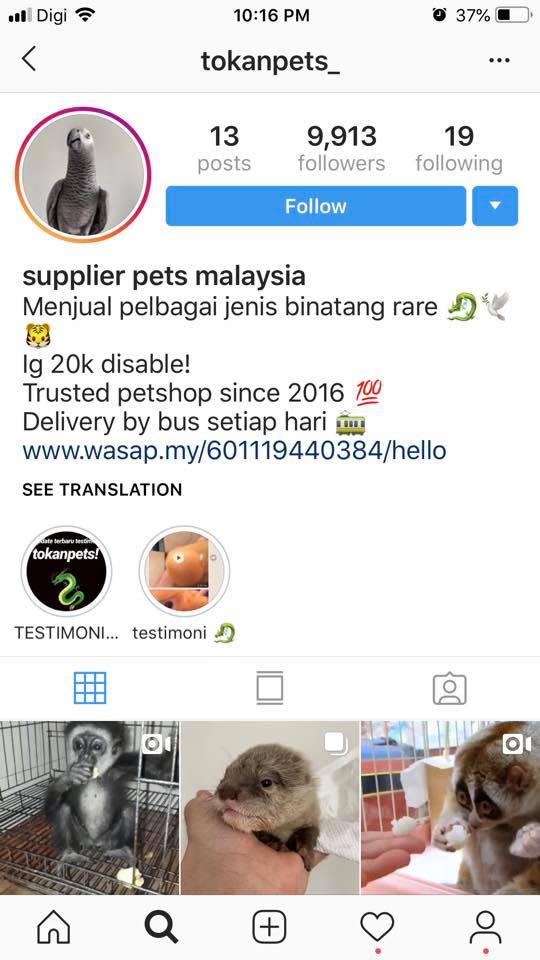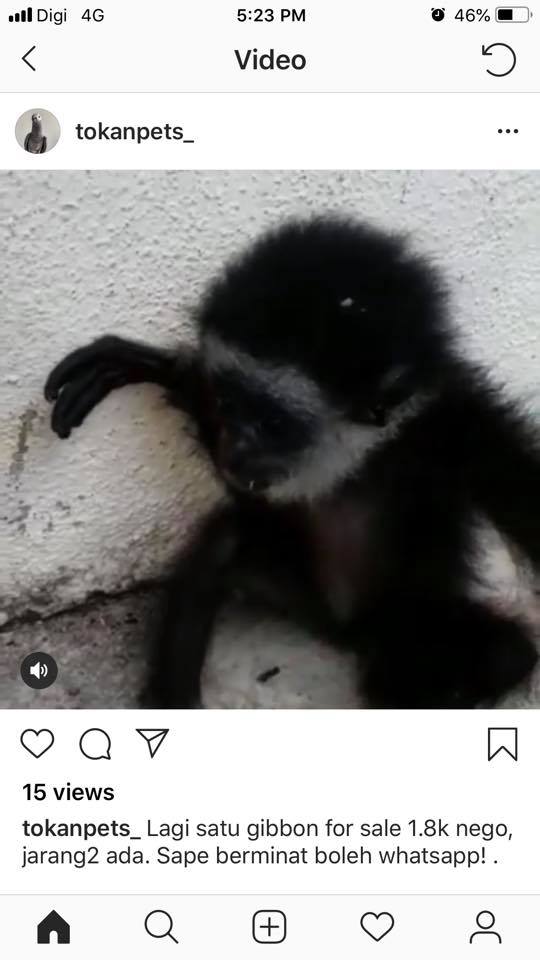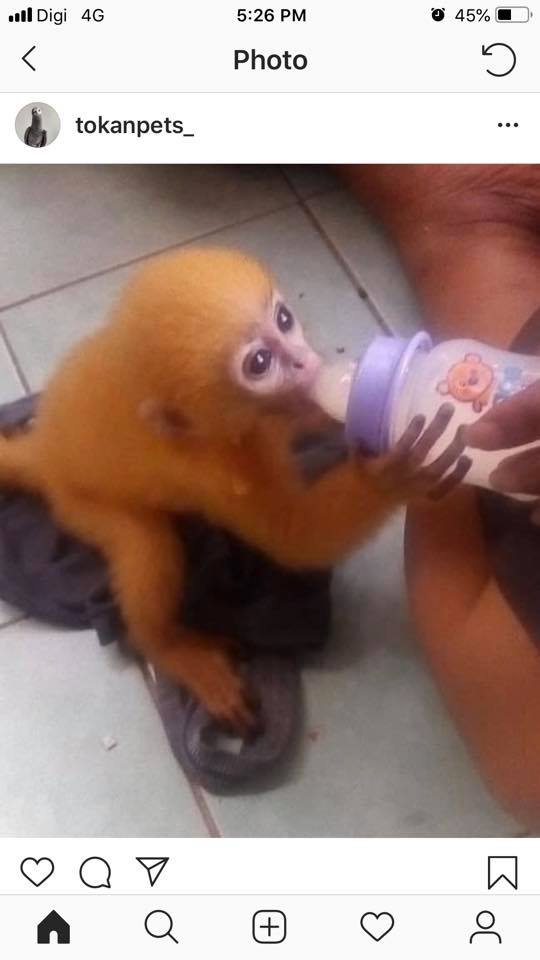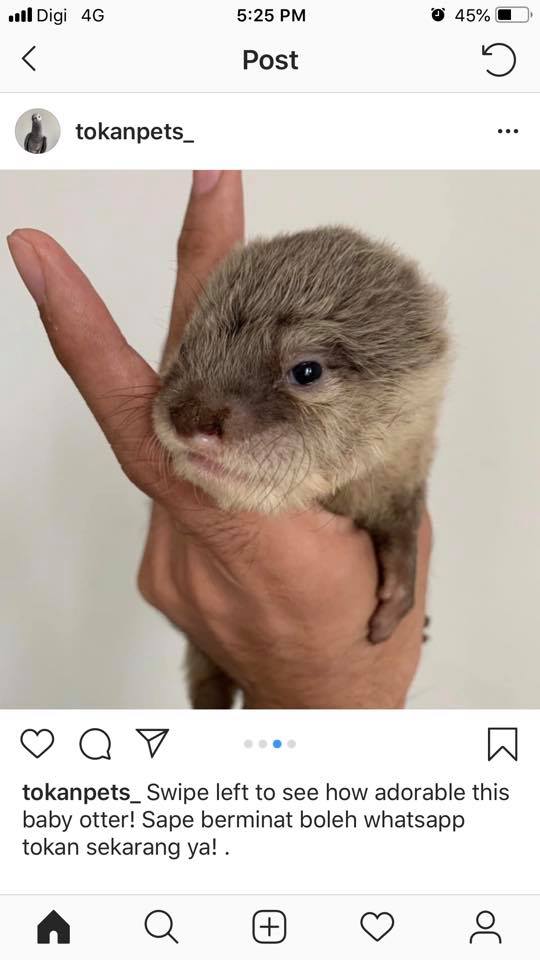One could say that the advent of social media has perpetuated the sale of illegal wildlife.
And a recent Facebook post exposed one such trader taking advantage of Instagram to market protected animals.
Illegal 'petshop' on Instagram
On May 31, 2019, one Facebook user by the name of Wong Siew Te, uploaded screenshots online of an Instagram account, @tokanpets_, that appeared to be selling wild animals.
The account, which labeled itself as a 'supplier of pets' in Malaysia, claimed to be "selling many kinds of rare animals", and even offered delivery by bus everyday.
It even touted itself as a "trusted petshop since 2016" in its description.
Shockingly, it had more than 9,000 followers.
 Photo by Wong Siew Te / FB
Photo by Wong Siew Te / FB
From Wong's screenshots, the account allegedly posted photos of various wildlife native to Malaysia.
Some posts even included the price at which the animals were being sold for.
One of the gibbons up for sale seemed to be living in appalling conditions—the photo depicted it in a small, rusty cage, bare of any objects.
 Photo by Wong Siew Te / FB
Photo by Wong Siew Te / FB
It was being sold for a "discounted" price of RM1,600 (S$525).
"Lai lai, dealer offer Ramadhan 1.6 k for this baby gibbon. Who's fast will get it, after this the baby gibbon will return to its original price! Whatsapp... "
 Photo by Wong Siew Te / FB
Photo by Wong Siew Te / FB
Another baby gibbon was being sold for RM1,800 (S$590), and the seller implored interested buyers to message him via Whatsapp.
"One more gibbon for sale, 1.8 k negotiable, rare ones also have. Who's interested can Whatsapp!"
While another monkey, likely a baby Dusky Leaf monkey, was seen being fed from a milk bottle.
 Photo by Wong Siew Te / FB
Photo by Wong Siew Te / FB
Other animals allegedly sold on the page included a baby otter, and a slow loris.
 Photo by Wong Siew Te / FB
Photo by Wong Siew Te / FB
Here's the translated caption:
"Swipe left to see how adorable this baby otter. Who's interested can whatsapp the dealer now, ok?"
 Photo by Wong Siew Te / FB
Photo by Wong Siew Te / FB
However, a quick search on Instagram showed that the page has since been removed.
Calling for justice
In his Facebook post, Wong actively called for greater conservation efforts in the country, and for netizens to report the page to Perhilitan, which is the abbreviated name for Malaysia's Department of Wildlife and National Parks.
Here is what Wong wrote in full:
Illegal wildlife trade in Malaysia is going out of control! A new Instagram user start selling Totally Protected Species online! Baby gibbons RM1800, baby dusky langur RM650, baby palm civet RMRM350, Baby Malay civet RM550, baby leopard cat RM650! If this is not breaking the wildlife protection laws, then what is? Please help report To PERHILITAN Wildlife HOTLINE at 1-800-88-5151! Please ask your friends and relatives to make report as well. We cannot let all of these wildlife go extinct in our country! Don’t wait until it is too late to act! Now everyone can help save our precious and remaining wildlife !!
Species sold are protected under local laws
In his post, Wong added that other wild animals such as palm civets and leopard cats were being sold on the Instagram page as well.
All the animals featured on the Instagram page are protected species under Malaysian law, according to the country's Wildlife Conservation Act 2010 (Act 716).
Creatures like slow lorises, of which there are eight species within the genus, are not only protected by local laws, but by international CITES laws as well.
All eight are classified as either vulnerable or endangered by the International Union for the Conservation of Nature (IUCN).
However, their large eyes, adorable faces, and penchant for eating riceballs have shot them to internet fame—likely increasing their demand as pets and subsequent poaching of the species.
 A slow loris' venomous teeth being clipped to make them 'safe' as pets. Photo from Wikipedia
A slow loris' venomous teeth being clipped to make them 'safe' as pets. Photo from Wikipedia
Lack of enforcement in Malaysia
Currently, Malaysian laws dictate that any person hunting a protected animal without a special permit can be fined up to RM500,000 and jailed up to five years if found guilty.
But actually catching perpetrators remains an issue.
But a Mongabay article in 2019 pointed out the lack of policing for players supplying illegally-obtained animals online.
The article cited their own sources from Perhilitan, stating that the e-crimes unit in the wildlife agency only had around three to four personnel.
However in May earlier this year, photos of several men in Malaysia posing with a dead clouded leopard went viral online.
Following the attention online, Malaysian authorities identified the men in the photos and gave them an ultimatum—come forward within a week or face arrest.
Despite social media being used as a tool for the illegal trade of wildlife as pets, perhaps it can help to garner greater support of wildlife conservation efforts to oppose such crimes as well.
You can view Wong's original Facebook post here:
Top photo by Wong Siew Te / FB
If you like what you read, follow us on Facebook, Instagram, Twitter and Telegram to get the latest updates.
